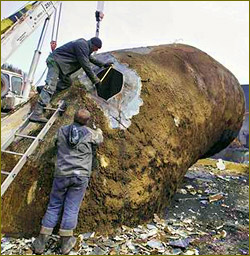05.11.2010 18:31
 The St. Petersburg Ecology Union is calling on the city’s hotels to join the Eco Hotel project in order to promote environmental protection and attract new clients.
The St. Petersburg Ecology Union is calling on the city’s hotels to join the Eco Hotel project in order to promote environmental protection and attract new clients.
The union, which has developed an ecological certification system for Russian hotels, said it expects at least three hotels to obtain eco status in St. Petersburg by the end of the year.
“In Europe the number of so-called ‘green’ hotels — hotels meeting special ecological standards — is increasing every year. In Russia, however, this field has not yet been developed,” Tatyana Baklanova, general director of BtG Event Solutions, the project’s official partner, said at a recent seminar on eco hotels in St. Petersburg.
“The status of eco hotel can be awarded to those who save electricity, heating and water; who sort their trash and encourage their guests to help protect the environment,” said Maria Vysotskaya, head of the eco hotel project at the St. Petersburg Ecology Union.
Vysotskaya said that in different countries, eco hotels have differing standards and requirements, depending on local nature conditions.
“For instance, in some countries hotels use solar or wind power to help protect the environment, but this is not possible in St. Petersburg, where we have very few sunny days and no wind power stations,” Vysotskaya said.
“So each country usually develops its own certification system for eco hotels. We have also devised our own certification system, Listok zhizni (Life Leaf),” she said.
The ecological Life Leaf label is included in the Global Eco Labels Network (GEN), and can therefore be trusted by both Russian and foreign guests, Vysotskaya said.
Vysotskaya said that due to the lack of alternative energy sources in Russia, the eco certification system is concentrated mainly on waste disposal issues.
To qualify for eco status, Russian hotels will have to reduce their use of disposable plates, glasses and other items, and sort their waste into categories including paper, plastic, broken glass, food fat and food waste so that it can be recycled.
Hotels seeking eco certification will also have to offer energy and water saving technologies, such as adjustable lighting and water-saving bathroom equipment.
In addition, Listok Zhizni has introduced requirements concerning the construction materials used to build the hotel.
Another condition for obtaining certification is the use of cleaning agents that contain fewer toxic elements.
Vysotskaya said the union’s experts are prepared to visit any hotel and check its eligibility for eco certification. The certification procedure costs from 100,000 to 150,000 rubles ($3,275 to $4,915).
Vysotskaya said that between three and five hotels in St. Petersburg are ready to apply for the project.
Ksenia Andreyeva, marketing manager of Reval Hotel Sonya, said the hotel was interested in checking its eligibility for getting ecological certification.
“It’s important for us, because eco status would not only prove our intention to take care of the hotel’s clients and personnel and of the environment; we also understand that this label could positively influence the hotel’s image and guarantee its competitiveness on the market,” she said.
Andreyeva said that Reval Hotel Sonya had already introduced a number of measures aimed at helping to protect the environment. The hotel asks its clients not to waste water, and to turn off the light when leaving the room.
“For instance, recommendations for how much light is necessary in the morning or in the evening are written on the electricity switches. There are also signs indicating when the room has 100 percent, 50 percent or less light,” she said.
The hotel asks guests to print out only the most necessary documents in order to save trees.
Metamorphosis, the hotel’s restaurant, offers a menu that includes vegetarian dishes, lactose- and gluten-free meals, and Russian dishes that contain only locally produced products.
Andreyeva said the Building Management System (BMS) that the hotel operates allows it to regulate electricity and heating consumption. If a room is not occupied, the hotel maintains a maximum temperature of 18 degrees Celsius to save on unnecessary heating. Just before the guest’s arrival, staff turn up the temperature in the room.
Electricity in the room can only be turned on with a guest card, and to prevent the pollution of the Baltic Sea, the hotel uses non-phosphate cleaning products.
Andreyeva said the Reval Hotel is interested in getting ecological certification, especially since all of the chain’s hotels located in the Baltic states already have eco status.
Baklanova said that the eco hotel status may not only attract additional clients who care about environmental safety, but also help hotels to reduce their expenses.
Sergei Lobanov, head of the city’s information and tourism center, said the presence of eco hotels would attract more tourists to St. Petersburg and so the city administration considers the project to be important.
Eco hotels are already popular in Europe. In Sweden, there are more than 100 such hotels, Baklanova said while the construction of “green office buildings” — energy-saving office buildings — is on the rise in Europe and the U.S.
The most “ecological” hotel in the world, the four-star Crown Plaza Copenhagen Towers, was built in the Danish capital in November 2009. Its 85-meter facade is equipped with the biggest solar batteries in Europe, and its system of cooling and heating water through the earth decreases energy consumption in the hotel by almost 90 percent.
From April 19, the hotel has offered its guests the chance to earn their dinner in a novel way — by pedaling an exercise bike connected to a power generator. Those who generate 10 watts in an hour are offered a dinner at the hotel’s expense.
News source: The St. Petersburg Times
 Print this news Print this news
Business news archive for 11 May' 2010.
Business news archive for May' 2010.
Business news archive for 2010 year.
|